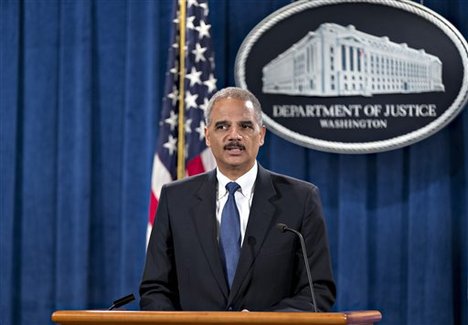U.S. Attorney General Eric Holder announced this morning that he is getting rid of “draconian” mandatory minimum sentences for low-level drug crimes. That’s big news everywhere. Talking to the American Bar Association in San Francisco, Holder said it well: “Too many Americans go to too many prisons for far too long.”
But his announcement was even more of a bombshell locally, given the state’s legalization of marijuana.
“Whoa!” utters Aaron Pelley, a defense lawyer who focuses on medical marijuana cases. “I couldn’t be happier to hear that.”
Federal drug laws have long sent a chill through suppliers of medical marijuana. And the laws loom menacingly in the background, too, for would-be entrepreneurs looking to get into the recreational market under recently-passed Initiative 502.
Up until now, if someone is caught with more than 99 plants, that person was looking at a mandatory five years in prison. And various sentencing enhancements, like one for the use of a gun, added on another five. Jeff Steinborn, another prominent defense lawyer active in marijuana cases says that even a pot grower who keeps a gun under his pillow could face a 10-year minimum.
And such a marijuana grower would be especially likely to face mandatory minimums in Eastern Washington, according to both Steinborn and Pelley. Federal prosecutors there have been far more eager than those in Western Washington to bring marijuana cases.
Yet on this side of the mountains, too, federal prosecutors have been known to bring pot cases. Just a few weeks ago, DEA agents raided several dispensaries, including Seattle Cross, Tacoma Cross and Bayside Collective in Olympia. Pelley, who represents a manager for the Seattle and Tacoma facilities, which are affiliated, says he believes a grand jury has been convened to bring charges.
How Holder’s announcement will affect those cases is an open question. Pelley, who had not yet read the attorney general’s remarks when contacted by SW, says he’s not sure.
Steinborn, who has read the remarks, says he’s skeptical that the affect will be profound. He says he’s worried, for instance, that the firearm enhancement will stay on the books.
Still, he takes note of this phrase in Holder’s speech–“federal prosecutors cannot – and should not – bring every case or charge every defendant who stands accused of violating federal law. Some issues are best handled at the state or local level.“ Steinborn speculates that it may signal that the feds are turning over the thorny issue of marijuana to state courts.
“That wouldn’t surprise me,” the lawyer continues. With a multi-million-dollar market on the table, he quips, marijuana has “now become a white-collar, white man’s crime.” The feds, he insinuates, might want to tackle that far more gingerly.








